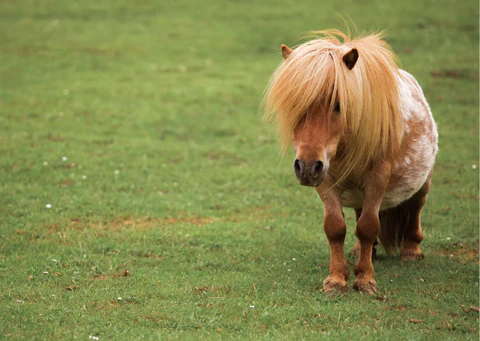Did you know that almost 16 % of older horses are too skinny? The same applies to 6 % of adult horses. As extreme weight loss can be life-threatening for your four-legged friend, it is important to intervene in good time— but to do just that, you need to find out why your horse or pony is too skinny first. Often that can be difficult to establish, which is why we list the main causes of weight loss in horses here.
STEP ONE — check whether your horse is too skinny
If you’re worried about your horse or pony’s weight, use the Body Condition Score (BCS). This is a handy, relatively simple way to visually assess your horse’s fat and muscles.
The BCS scores horses on a scale from 1 to 9. 1 is emaciated, 9 is extremely fat. In other words, if your four-legged friend scores 5, he is just right. If you can clearly see his ribs, your horse is too skinny.
Ideally, you should be able to feel, not see, your horse’s ribs.
STEP TWO — figure out why your horse is too skinny
The most common causes of weight loss in horses and ponies are: anorexia, a higher energy requirement, malnutrition, malabsorption, and parasites.
1. Your horse refuses to eat (anorexia)
This can be a sign of illness, pain, or anxiety. If your horse hasn’t eaten for 48 hours, get on to your vet.
Anorexia can have plenty of causes, so it is important to have your horse thoroughly examined. Don’t wait too long because horses and ponies have a highly sensitive digestive system.
Tip: get your vet to check your horse’s teeth at least twice a year. That way you can be sure that he has no dental problems, which leads to anorexia or refusal to eat.
If your horse is in trouble with his teeth, he may…
-
eat slowly.
-
have problems chewing.
-
spill or throw grain.
-
spit out balls of hay (quid).
-
produce more saliva than usual.
-
push feed back and forth in his mouth.
-
suffer from bad breath.
-
suck his feed (and develop chubby cheeks because he clenches roughage between his jaws).
2. Your horse requires more energy
If your horse uses more energy than he takes in, he will lose weight. Various physiological and pathological circumstances may increase his need for energy, but this will by and large vary from horse to horse.
2.1. Sport horses
The more he trains, the more energy your horse will need. Stands to reason, no? A horse in training will on average need 15 % more energy than a horse that is not in training.
2.2. Pregnant and lactating mares
In the final three months of gestation, your mare’s energy requirements will increase by 35 %.
While she is feeding her foal, she will need twice her regular amount of energy!
2.3. Older horses
In older horses, the ability to digest or absorb nutrients decreases, causing their daily energy requirements to increase.
2.4. Horses recovering from an illness or surgery
Horses recovering from surgery will need 10 % more energy than usual. To recover from a serious illness, your four-legged friend will need a staggering 60 % more energy than usual.
2.5. Also when the weather turns inclement, your pal will benefit from a little extra energy.
A horse’s ideal ambient temperature is between -5 and 15 °C. Below or above that, your horse will suffer.
A practical rule of thumb: for every degree below -5 °C or above 15 °C, your horse will need 2.5 % extra energy.
3. Your horse is malnourished
Your horse may be eating enough but the quality of his feed could leave a lot to be desired, which is why he doesn’t take in enough energy and loses weight.
4. Your horse doesn’t absorb any nutrients
This condition is called malabsorption. In this case, your horse eats enough, good quality feed but his intestines don’t properly digest or absorb the nutrients. Malabsorption is often caused by an inflammation of the intestines.
5. Your horse has parasites
Worms in the intestines don’t only cause inflammation but also live off the nutrients your horse needs.
STEP THREE — treat your horse
You are what you eat. And that goes for horses too. If your horse is underweight and doesn’t suffer from an underlying illness or worms, his diet might be the issue and may need adjusting — with Grow & Glow, for instance.



